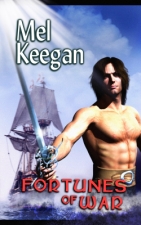



I have to say, this is absolutely beautiful. It's one of my mother's gifts for Mother's Day (in a few weeks), but I'll be delighted to work with this format and issue most or all of the Keegans -- stand by for a special page.
This is also my first experiment with the "publisher grade paper" which is now an option at Lulu.com ... and again, I'm impressed. It's a beautiful job. The paper is top-notch: whiter and smoother than the regular paper, and yet a lot more opaque, so there's no strike through. Lovely. The only downside is that the book is very slightly smaller than the fill-sized US trade size (6" x 9"). This is fine by me -- it's still larger in both axes than the old GMP editions. And, being large print, it's over 600pp ... which is impressive.
Nice!
I just went over to Lulu and gave the book the "nudge" to the public list, and you can now order this item:
The Swordsman, large print edition, 609pp. US$23.95.
In the coming weeks, I'll be getting together a good list for visually impaired glbt readers, and then we'll do a press release and a newsletter. If you're "blind and gay," or are supportive of someone who is ... and if you could spread the word ... this would be marvelous, and Keegan thanks you.
Cheers (again),
MK


























1 comment:
Responding first to your earlier query:
E-books are actually a problem for blind readers at the moment, because a lot of them come with DRM that prevents read-aloud. Or they're in PDF, which isn't necessarily the best format for every low vision reader, because it locks the reader into viewing the book in whatever typeface the publisher prefers. And if the PDF file isn't set up properly, you can't take the typeface higher than a certain size, because the lines will scroll off the end of the screen.
Of all the proprietary formats I've looked at, Mobipocket is the most accessible, because the reader can choose any font and size. But I still prefer non-proprietary formats such as HTML, RTF, and plain text. They're the easiest to work with.
As to where to find gay books for the blind . . . When I became partially sighted in 2001, the answer was: Almost nowhere. There were literally under a hundred GLB titles at that time that were in formats specially designed for the blind. I know, because I went looking for them. The reason for this wasn't simply the fact that only 5% of books are translated into formats for the blind. The reason, I'm afraid, is that organizations for the blind have traditionally taken a paternalistic approach, censoring publications they consider harmful to the blind (although in that particular case, Congress was to blame).
Back in 2001, a few gay titles were available in accessible formats that are used by sighted readers, such as audio books, but not as many as one would like. E-books seemed like the best possibility, but you had to have money to buy e-books, and as someone who (1) didn't have much money and (2) was a lifelong library reader, this all grated on me. This is why I ended up in the world of online fiction at the beginning of 2002 - there was simply no other place for me to go for accessible gay reading matter that was free.
Then Bookshare.org came along in 2002, and everything changed, at least for American readers. Bookshare's books are submitted by volunteers, many of them blind, so they decide what reading matter is "suitable." To date, there are 800 books in the Gay and Lesbian section. Alas, readers have to pay a yearly fee, but Bookshare makes its holdings available for free to American students. If anyone reading this wants to contribute, Bookshare welcomes printed books or scans of books. (It's all legal.) Authors and publishers can contribute electronic copies of their books. That's the easiest way to reach blind and low vision readers in the U.S.
However, large print books will always be welcome, so I applaud your decision to bring out "The Swordsman" in large print.
My post-production thoughts on the design:
It's really impossible to construct the "perfect" large print book, because different readers have different needs. But I like the fat typeface you chose (what is it, by the way?), and I really like that you included wide margins. It's amazing how few large print books have any margins to speak of.
Anyway, thanks for posting about this. If you end up wanting more information on this topic from someone who's blind (as opposed to low vision, which is what I am), a good person to consult is Kestrell, who has a page on accessible erotica at her Blind Bookworm site. She posts periodically at her blog about accessibility issues for readers.
Post a Comment